Sarah Chorn's Blog, page 57
October 5, 2015
The Fifth Season – N.K. Jemisin
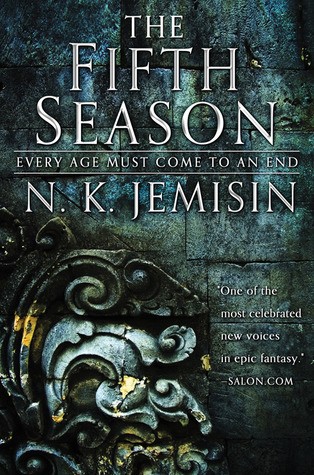 About the Book
About the Book
This is the way the world ends. Again.
Three terrible things happen in a single day. Essun, a woman living an ordinary life in a small town, comes home to find that her husband has brutally murdered their son and kidnapped their daughter. Meanwhile, mighty Sanze — the world-spanning empire whose innovations have been civilization’s bedrock for a thousand years — collapses as most of its citizens are murdered to serve a madman’s vengeance. And worst of all, across the heart of the vast continent known as the Stillness, a great red rift has been torn into the heart of the earth, spewing ash enough to darken the sky for years. Or centuries.
Now Essun must pursue the wreckage of her family through a deadly, dying land. Without sunlight, clean water, or arable land, and with limited stockpiles of supplies, there will be war all across the Stillness: a battle royale of nations not for power or territory, but simply for the basic resources necessary to get through the long dark night. Essun does not care if the world falls apart around her. She’ll break it herself, if she must, to save her daughter.
449 pages (paperback)
Published on August 4, 2015
Published by Orbit
Author’s webpage
Buy the book
This book was sent by the publisher in exchange for an honest review.
—
My life these past few months has been kind of insane. I’ve been catching up on things that have slipped through the cracks during the chaos. I start working in a week and a half, so I’m expecting another upheaval. I’m trying very hard to clean up my messes before more start. In an effort to do just that, I was looking through my bookshelf at books I needed to review but probably forgot to. The Fifth Season jumped out at me. It was one of my most anticipated books, and I can’t believe I completely forgot to review it.
Oops.
The Fifth Season kind of frustrated me at the start. The world building confused me. The characters took some time to get used to due to unique voices and percpectives. However, I’ve read Jemisin’s work before, and I know that sometimes with her the reward comes after you put in some effort. This book is kind of like a puzzle. Things might not make much sense at the start, but they do all slip into place, and when that happens it is absolutely delightful. Until then, just sit back and enjoy the story as it unravels. It’s detailed, layered, and completely genius. You can’t help but admire that even when you might not understand how it all fits together.
The Stillness, the continent where this takes place, is rather ironically named because the last thing it would really be considered is still. There are a lot of earthquakes, and other geological shifts which uproot things. Furthermore, previous “Seasons” or apocalyptic events. Individuals born with special magic to shape and effect the land called orogenes can influence when these seasons happen, and how the land changes.
The magic system is rather genius, and shows just what Jemisin does so well. Everything has a price. This powerful magic is often wild and uncontrollable. While these people are incredibly important, most people fear them because they are so unpredictable. Often if they aren’t found and taken away for rigorous training by fellow orogenes, they are killed by family members or neighbors. It’s rather dark, but it is incredibly realistic. Not every power is a power people would want to have, and Jemisin does such a wonderful job showing not just the importance of power, but the uncomfortable price of it.
The Fifth Season starts out showing just what that price is, with the death of Essun’s son, who was discovered to be an orogene by her husband, who then took her daughter and ran. In a lot of ways this is a book woven together by love and determination. There is a lot of darkness, and a lot of polarization, but the love of a mother for her children, and the pain she feels, is something that anyone can relate to or sympathize with, and it shines bright throughout the novel. Essun is an unforgettable character with a grounded voice that shows the confusion, pain, and majesty of the world she lives in and the story she is telling.
There are two other main perspectives in The Fifth Season, one is a young orogene girl who is being taken away for training, and another is an young woman who is a trained orogene. Her job is to ensure the next generation of orogenes through a selective breeding process. Slowly these stories all weave together and form a rather incredible tapestry. Aside from the world building, it’s really the characters that work so well in this book. They are remarkable, and finely wrought. They are full of contrasts – hope and despair, light and dark, pleasure and pain, and they are obviously honed by the harsh world and the even harsher magic that plays such a huge role in their lives.
It’s really incredible how well Jemisin crafted her world, her magic, and her characters. The story is absolutely unforgettable and impossible to put down. It might take a little effort for readers to get into it because it can be a little confusing at the start, but even then it’s hard not to appreciate the magic of this book. This is the first book in a trilogy, and Jemisin did an incredible job laying the groundwork for future books, and telling an amazing story while she did it.
As I said above, I’ve read Jemisin’s work before, but when I look at all of her books that I’ve read, this one is probably my favorite. It shows everything that Jemisin does so well, excellent world building, complex characters, and a layered, addicting plot. This book has it all.
5/5 stars
September 30, 2015
Self Published Fantasy Blog Off Update – Finalists & What To Expect
I was thinking of stuff I needed to do yesterday, and I realized I needed to write an update regarding the grand ol’ SPFBO. All of us have decided our best book, and now we are just reading all of the finalists. We will determine the winner in March, if not sooner (depending on how fast we all read).
My process for this last portion of the contest is going to be a bit different than it was before. Here’s what you can expect:
I will fully and completely read each of these 10 final books. I will fully review each book in my normal style. When each book has been read and reviewed, I will announce the book I selected as the best out of the ten. You will be able to tell each review for this final part of the contest by the subject “SPFBO | Book Title – Author’s Name.” There is no real order that I’ve chosen to read these titles. Basically the process goes like this: I ask myself what I’m in the mood to read. I look at the books I have to choose from, and pick one that best fits my mood. It is super scientific.
Another note, I have no idea what website (other than my own) has chosen which book for this final round. I have not read any of their reviews, nor will I. I’m working hard to keep my opinions my own, and untainted by input from the others participating, all of whom I highly respect and think of as influential.
There is no real schedule for this portion of the contest, so just expect reviews to pop up when I get to them. I’ve already read three of these books, and I’m just basically waiting to get through some obligations to publishers and authors before I can actually review them. Sorry, I’m a bit behind with some stuff due to birthing a child and lack of sleep and all that fun stuff.
In case you’re wondering what the final ten books are for this contest, feast your eyes:
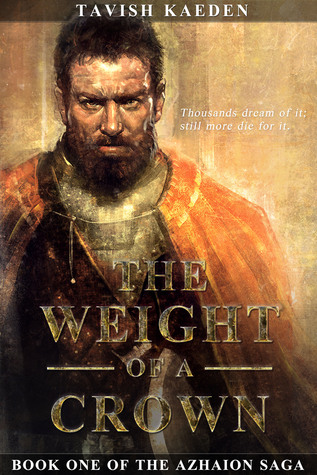 The Weight of a Crown – Tavish Kaeden
The Weight of a Crown – Tavish Kaeden
Buy the book
THE WEIGHT OF A CROWN
Thousands dream of it; still more die for it. Yet, how many can truly bear it?
After centuries of bitter conflict the realm of Esmoria is at last united under the banner of a single king. On the surface the realm appears to be enjoying its first taste of peace, but lingering resentment and the untimely death of the new ruler threaten to return Esmoria to political chaos.
Meanwhile, in the farthest reaches of the frozen north, a dethroned monarch’s plot for revenge awakens a long-forgotten evil. As darkness and treachery descend upon the realm, a young escapee from a forced labor camp, a disenfranchised soldier, and an epileptic engraver’s apprentice find themselves at the heart of the troubles.
—
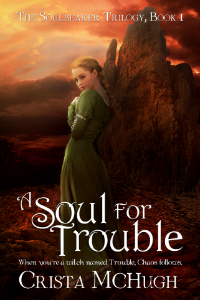 A Soul for Trouble – Crista McHugh
A Soul for Trouble – Crista McHugh
Buy the book
When you’re a witch named Trouble, chaos follows.
Arden Lesstymine (known to everyone as Trouble) likes attention as much as the next girl, but this is getting ridiculous. When an insane stranger is murdered at the inn where she works, Trouble becomes the next Soulbearer for the disembodied god of chaos, Loku. Yes, it comes with the ability to channel the god’s limitless power, but at the cost of her sanity — literally. Now she has a sexy but cynical knight claiming to be her protector, a prince trying to seduce her to his cause (and his bed), and a snarky chaos god who offers a play-by-play commentary on it all, whether she wants to hear it or not. To make matters worse, a necromancer wants to capture the soul of Loku for his own dark purposes, and the only way he can get it is by killing her first.
—
 Bloodrush – Ben Galley
Bloodrush – Ben Galley
Buy the Book
“Magick ain’t pretty, it ain’t stars and sparkles. Magick is dirty. It’s rough. Raw. It’s blood and guts and vomit. You hear me?”
When Prime Lord Hark is found in a pool of his own blood on the steps of his halls, Tonmerion Hark finds his world not only turned upside down, but inside out. His father’s last will and testament forces him west across the Iron Ocean, to the very brink of the Endless Land and all civilisation. They call it Wyoming.
This is a story of murder and family.
In the dusty frontier town of Fell Falls, there is no silverware, no servants, no plush velvet nor towering spires. Only dust, danger, and the railway. Tonmerion has only one friend to help him escape the torturous heat and unravel his father’s murder. A faerie named Rhin. A twelve-inch tall outcast of his own kind.
This is a story of blood and magick.
But there are darker things at work in Fell Falls, and not just the railwraiths or the savages. Secrets lurk in Tonmerion’s bloodline. Secrets that will redefine this young Hark.
This is a story of the edge of the world.
—
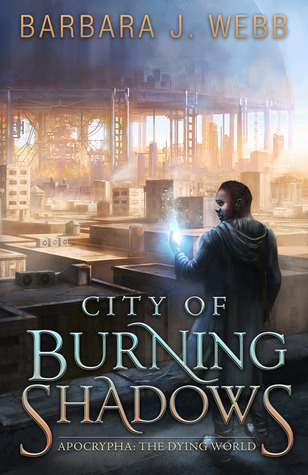 City of Burning Shadows – Barbara J. Webb
City of Burning Shadows – Barbara J. Webb
Buy the book
Joshua “Ash” Drake is a man in hiding.
Hiding from the past, from the horror of his life as a priest after the gods disappeared.
Hiding from his emotions, denying the nightmares that haunt his sleep and the anger that fuels his days.
Most of all, hiding from the truth—that no matter how much he keeps his head down, no matter how he clings to the echoes of everyday life, his city—his world—is dying.
When a new technology offers salvation to his desperate city, Ash must reach out to people he left behind and step back into the world that almost killed him. But coming out of hiding now could be the worst mistake Ash has ever made.
Because there are monsters in the darkness, feeding the chaos, watching the city burn. And once those monsters know his name, Ash will never be able to hide again.
—
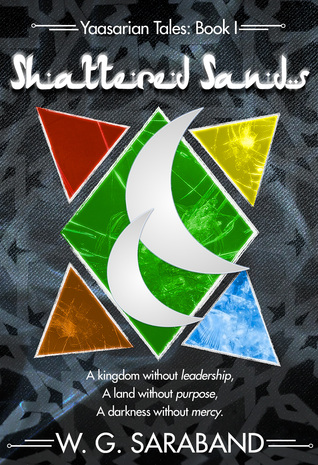 Shattered Sands – W.G. Saraband
Shattered Sands – W.G. Saraband
Buy the book
For years, Tamazi felt she was nothing like the other slave-girls. It was not until her master disappeared, the Great Vizier of the desert kingdom of Rilmaaqah, that a power older than the sands themselves took hold of her; a power that could finally free her, or enslave her forever.
Rilmaaqah is in chaos. The fires of rebellion spread, and the winds of change threaten the Mageocracy, as the common people rise with the courage to claim their share. But the sands hide many things, and it falls to an unlikely group of people to put a stop to death, before she sings her lullaby to the living.
—
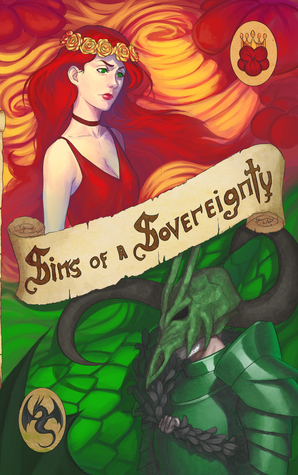 Sins of a Sovereignty – Plague Jack
Sins of a Sovereignty – Plague Jack
Buy the book
From their prisons, the old gods watch, and wait.
Calcifer, the arrogant and obtuse sorcerer turned monster hunter, wants nothing more than to bleed his country of its gold, and return to his lover. When she is assaulted and her mind is left in tatters, Calcifer seeks vengeance by any means necessary.
Sir Clark Pendragon has murdered more men than he cares to remember. Tired and battle scarred, the old knight just wants to live out his last days in peace. When he is needed to stop an assassination, Pendragon is ripped from his retirement and sent north to save his country one final time.
Shrike, keeper of Amernia’s secrets, spends his days combing through letters in search of blackmail. Cunning, and with a mind sharper than a blade, Shrike’s luck is slowly running out, as sinister shadows conspire against him.
War is coming to Amernia, and the Blood Queen stands at the heart of the chaos. A wave of hatred ripples across her country, and she maintains order with fire and fear. The rift between rich and poor, human and nonhuman, divides the kingdom more everyday, as a spectral rider streaks across the sky, heralding the death of kings.
The fates of Calcifer, Pendragon, Shrike, and the Blood Queen are hopelessly intertwined, and new alliances will be forged and broken as war threatens to tear Amernia asunder.
—
 The Thief Who Pulled on Trouble’s Braids – Michael McClung
The Thief Who Pulled on Trouble’s Braids – Michael McClung
Buy the book
“They butchered Corbin right out in the street. That’s how it really started. He was a rogue and a thief, of course. But then, so am I. So when he got himself hacked up in front of his house off Silk Street, I decided somebody had to be made to pay. They thought that they could just sweep him away like rubbish. They were wrong.”
Amra Thetys is a thief with morals: She won’t steal from anybody poorer than she is. Fortunately, anybody that poor generally doesn’t have much worth stealing! But when a fellow thief and good friend is killed in a deal gone wrong, Amra turns her back on burglary and goes after something far more precious: Revenge.
—
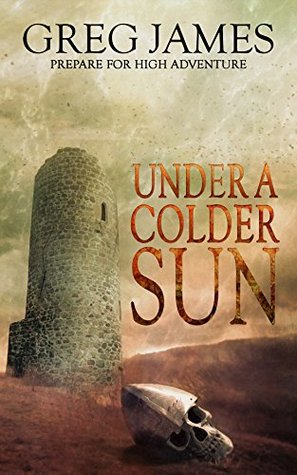 Under a Colder Sun – Greg James
Under a Colder Sun – Greg James
Buy the book
A Grimdark Fantasy Adventure set in a world of Darkness and Chaos!
Khale the Wanderer: dark warrior of legend, a reaver with a demon’s soul.
King Alosse: ruler of Colm, willing to risk everything to save his city and its people.
Princess Milanda: an innocent, kept pure since birth, unknowing of her fate.
Neprokhodymh: the cursed city of sorcerers where Khale must make a choice that will scar him for life, or fall into darkness forever.
—
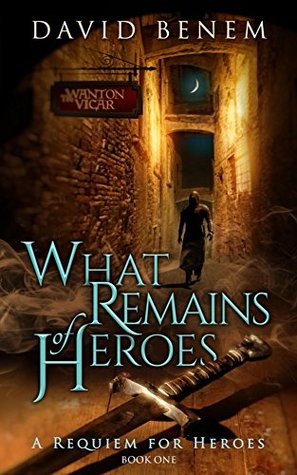 What Remains of Heroes – David Benem
What Remains of Heroes – David Benem
Buy the book
Lannick deVeers used to be somebody. A hero, even. Then, he ran afoul of the kingdom’s most powerful general and the cost he paid was nearly too much to bear. In the years that followed, his grief turned him into a shadow of his former self, and he spent his days drowning his regrets in tankards of ale.
But now an unexpected encounter casts Lannick upon an unlikely path to revenge. If he can just find the strength to overcome the many mistakes of his past, he can seize the chance to become a hero once more.
And with an ancient enemy lurking at the kingdom’s doorstep, he’d better.
—
 Priest – Matthew Colville
Priest – Matthew Colville
Buy the book
After years spent in the inn he bought and never opened, Heden is drawn out, and sent into a dark forest to investigate the death of a knight.
Nothing is what it seems. Why was Heden chosen for this mission? Who killed the knight and why? Why won’t anyone talk to him? As the Green Order awaits Heden’s final judgement, he finds his morality, perspective, and sense of self are each challenged and then destroyed.
Perhaps nothing, even right and wrong, can survive in the haunted wood.
September 29, 2015
Cold Iron – Stina Leicht
 About the Book
About the Book
Fraternal twins Nels and Suvi move beyond their royal heritage and into military and magical dominion in this flintlock epic fantasy debut from a two-time Campbell Award finalist.
Prince Nels is the scholarly runt of the ancient Kainen royal family of Eledore, disregarded as flawed by the king and many others. Only Suvi, his fraternal twin sister, supports him. When Nels is ambushed by an Acrasian scouting party, he does the forbidden for a member of the ruling family: He picks up a fallen sword and defends himself.
Disowned and dismissed to the military, Nels establishes himself as a leader as Eledore begins to shatter under the attack of the Acrasians, who the Kainen had previously dismissed as barbarians. But Nels knows differently, and with the aid of Suvi, who has allied with pirates, he mounts a military offensive with sword, canon, and what little magic is left in the world.
672 (hardcover)
Published on July 14, 2015
Published by Saga Press
Author’s webpage
Buy the book
—
There are quite a few underrated authors out there. These are authors with a disgusting amount of talent, but not nearly the attention for said talent that they deserve. Stina Leicht, in my humble opinion, is at the top of that list. I fell in love with her writerly abilities with her duology The Fey and the Fallen. When I heard she was writing an epic fantasy in a secondary world, I knew I had to check it out.
Cold Iron is, as I mentioned, set in a secondary world, and it is epic in just about ever sense of the word. There are queens and kings, princes and princesses, and a ton of political intrigue to keep those who like that sort of thing happy. The book starts out with a younger prince. Nels is a teenager on the cusp of adulthood. He gets himself into a situation, makes a few youthful mistakes that end up impacting the rest of his life, and his twin sister’s life as well. These mistakes lay the foundations for the roles each twin will play in their lives.
I have to admire Leicht for using such a huge error of judgment on Nels part as the foundation for just about everything that comes later. It’s nice to see that princes and princesses can make very human mistakes, and live out the results of those mistakes with poise and grace, if not a bit of very believable challenge.
The king and queen play influential roles without ever really stepping into the limelight in this book. The real focus is on Nels and his twin sister Suvi, both of whom are out in the real world. This is a great way for readers to get real and gritty insight into the growing conflict, as well as some great insight into the cultural details that impact the book so dramatically. Furthermore, despite the fact that Nels and Suvi are both royalty, they are also very human in face of their grand titles. It’s easy to forget that this is a prince and princess, and just enjoy their stories because they are so very, very human.
In some ways Leicht does subvert typical character roles. Suvi is more comfortable on a ship, taking action, than griping about what is going on in the greater world while she lives safely behind palace walls. She wears pants, and battles beside whoever needs her and isn’t afraid to work hard. Nels is a man who seems more comfortable among the lowly soldier than in a palace. He lives a humble life, so humble in fact that it is easy to forget that he born into nobility. It’s rather refreshing to see such high status protagonists stripped of just about everything that makes them high class. They are shockingly human, and beautifully flawed.
I will admit that the book started out a little rough around the edges, but it quickly evens out. Perhaps my biggest complaint was that some of the world building never quite fleshed themselves out completely. I really hesitate to go into more detail than that because it could give away important plot issues. For example, the fixation on death is very, very important, but I never really understood why it was such a fixation or how exactly it determined social roles (at times). I don’t really know if that makes sense. You’ll probably have to read the book to see what I mean.
A lot happens in Cold Iron. This is, in a very real sense, a book that explores everything that leads up to That Big Event. It’s an eloquent, and detailed introduction for everything that will probably happen later in the series. This book is a slow burn, but it is delightfully addicting and incredibly readable. Everything winds together intricately to create a memorable end that will leave readers hanging on for the next book in the series.
This is a rather thoughtful epic fantasy, and I’d really expect nothing less from Leicht. She takes common themes like destiny and fate, the role of the chosen one, and violence itself and toys with them in such a way that readers won’t help but question them, and think about these themes. Each character has their strengths and their weaknesses, but perhaps the real strength of the book as a whole is the fact that this epic fantasy is so incredibly human in just about every respect. In a genre where so many books are more incredible, more fantastic, more magical, Leicht has somehow managed to take all that makes epic fantasy so damn addictive, and turn it into a believable human saga that is not only immensely readable, but completely memorable.
Is Cold Iron perfect? No, but perfection is boring. It is, however, thoughtful as it subtly examines some common epic fantasy themes, and leads readers to a wham-bam ending that will leave them yearning for more. Leicht is an incredibly talented author. Her books are always such a delight.
4/5 stars
September 28, 2015
Guest Post | The Key to a Character – Ilana C. Myer (+ GIVEAWAY)
 About the Author
About the Author
Ilana C. Myer has written for the Globe and Mail, the Los Angeles Review of Books, Salon, and the Huffington Post. Previously she was a freelance journalist in Jerusalem for theJerusalem Post, the Jewish Daily Forward, Time Out Israel and other publications. She lives in New York City.
Ilana was born in New York but grew up in Jerusalem, Israel, where she spent her teen years haunting secondhand bookstores in search of books written in English—especially fantasy. It was in one of these shops that she discovered David Eddings and realized that epic fantasy continued after Tolkien, and from there went on to make such marvelous discoveries as Tad Williams, Robin Hobb, and Guy Gavriel Kay.
Since learning to read, Ilana had decided she would write books, but during college in New York City was confronted with the reality of making rent, and worked as a receptionist, administrative assistant, and executive assistant where she on occasion picked up dry cleaning. She afterwards found more fulfillment as a journalist in Jerusalem where she covered social issues, the arts, and innovations in technology, and co-founded the Middle East environment blog, Green Prophet. It was during these years in Jerusalem, on stolen time, that Last Song Before Night took shape.
She writes as Ilana Teitelbaum for various outlets, but decided early on—since the days of haunting bookstores, in fact—that “Teitelbaum” was too long for a book cover. “Myer” is a variation on the maiden name of her grandmother, whose family was exterminated in Germany. It is a family with a long history of writers, so it seems appropriate to give credit—or blame—where it’s due.
Read more about her on her website
Buy Last Song Before Night
—
The Key to a Character
By: Ilana C. Myer
 I was reading Mark Lawrence’s very interesting recent post about fantasy worldbuilding, where he compares it to an iceberg: What we see on the surface—in the text—is not the totality of what there is. And I thought about how aptly this can apply to a more microcosmic but just as important creative process—that of building a character from the ground up. (Mark does talk about this, but goes into greater depth about worldbuilding in general.)
I was reading Mark Lawrence’s very interesting recent post about fantasy worldbuilding, where he compares it to an iceberg: What we see on the surface—in the text—is not the totality of what there is. And I thought about how aptly this can apply to a more microcosmic but just as important creative process—that of building a character from the ground up. (Mark does talk about this, but goes into greater depth about worldbuilding in general.)
The iceberg metaphor applies: We’re not necessarily going to burden the reader with all the details about a character—what her grandparents were like, whether she was forced to wear fussy dresses as a child (unless that is relevant), and what her favorite foods are. Now if we were Victor Hugo writing Les Miserables we would do this, and much more; we would talk about the crops grown on the family estate through the centuries, which ones thrived and which failed, the various wars that killed off the characters’ great-great-uncles and whom the great-great-aunts consequently remarried; but most of us are not writing nineteenth century literature. Flashbacks are allowed, but should be applied judiciously, like salt. (Contemporary literary fiction slows the action with too many precious, self-indulgent flashbacks, but that’s a topic for another post.)
On the other hand, since we are sharing relatively few details about the character, each detail counts for more. It’s the difference between Realist paintings, in which the gradations of each shadow are lovingly noted, and a Matisse which uses just a few powerfully placed lines. An example that comes to mind is George R. R. Martin’s introduction of Danaerys Targaryen in A Game of Thrones. Martin doesn’t go into extensive detail about Dany’s past life before we meet her being sold to the Dothraki by her brother Viserys, but there is one detail that sticks with the reader: The house with the red door, the place Dany goes back to in her mind because it’s the one place where she was happy. As the story progresses and Dany suffers loss after loss, horror after horror, that image of the house with the red door gains in poignancy. We feel nostalgia and sadness for that brief period of innocence that can never be returned to her.
It’s all we have of her past, but it works.
Part of the reason this works, however, is because Martin has so many viewpoint characters. A story with a single protagonist might operate differently. Take Robin McKinley’s The Hero and the Crown, where we as readers are taken back through the details of Aerin’s evolution into dragon-killer. We see the humiliation she experiences at court, her status as an outsider, that drives her to prove herself. A different book might have started with the day Aerin rides out to confront the great dragon Maur, but instead McKinley chose to take us through her development and past. And it works beautifully: By the time she reaches that critical encounter, we have worked with Aerin, suffered with her, are rooting for her to succeed against Maur—and will feel every lick of flame.
In The Hero and the Crown, we see more of the iceberg. In consequence, readers are likely to feel more deeply involved with Aerin than with Dany. But even as McKinley goes into detail about Aerin’s past, the details are chosen with care. It is a more thorough rendering of the character’s background than Martin’s, but it is still a Matisse. The colors shine, the lines are exquisite, and ultimately it captures the reader to the last page.
—
GIVEAWAY
First things first, I’m running on about no sleep due to having an infant in the house. If this giveaway runs very long, I will forget it is happening. Therefore, you have until Thursday, October 1 at midnight to enter. The giveaway is open to residents of the United States and Canada. One entry per person. To enter just leave a comment below this post. I will notify the winner on Friday.
Good luck to all who enter!
September 23, 2015
Guest Post | The Author Interview I’d Give Myself – Cindy Dees
 About the Author
About the Author
Cindy Dees started flying airplanes while sitting in her dad’s lap at the age of three and got a pilot’s license before she got a driver’s license. At age fifteen, she dropped out of high school and left the horse farm in Michigan where she grew up to attend the University of Michigan.
After earning a degree in Russian and East European Studies, she joined the U.S. Air Force and became the youngest female pilot in its history. She flew supersonic jets, VIP airlift, and the C-5 Galaxy, one of the world’s largest cargo airplanes.
She also worked part-time gathering intelligence. During her military career, she traveled to forty-two countries on five continents, was detained by the KGB and East German secret police, got shot at, flew in the first Gulf War, met her husband, and amassed a lifetime’s worth of war stories. Cindy has turned many of her experiences into novels of military romance and suspense.
Cindy’s hobbies include professional Middle Eastern dancing, Japanese gardening, and medieval reenacting.
Winner of a Golden Heart and Holt Medallion for writing, Cindy is a two-time winner of the prestigious RITA Award for Romance Fiction, two-time winner of RT Book Review’s Best Harlequin Romantic Suspense Novel of the Year, is a Romantic Times Lifetime Career Achievement nominee, and a Waldenbooks best selling author.
Her 45th romance novel was recently published, and she’s looking forward to the release of her first epic fantasy novel with co-author, Bill Flippin, in 2015.
You can read more about the author on her webpage.
Buy The Sleeping King here.
—
Lots of people must ask how you and Bill wrote a book based on a live-action game, but what’s the rest of the story?
The obvious answer is that we described the characters the players created and wrote down what they’ve done. Beyond that, THE SLEEPING KING got written the same way any book gets written. Hundreds and hundreds of hours sitting at a desk typing, angsting, editing, and fretting. Indeed, that just describes the typing exercise of drafting a book, though.
The rest of the story, however…
Everyone knows a big challenge in writing epic fantasy is the world building. But, once the world is built, the bigger challenge is deciding what details of the world that should be included in the book to make the world feel real and textured. How little description is too little, and how much is too much? The correct answer to this is a matter of personal taste among readers, as well. Some will complain that there was too much detail that slows the pace of the story, and others will howl that things were hinted at but not spelled out. It’s a constant struggle to find the right balance.
Another challenge in writing our books has been the collaboration itself, particularly at long distance. We’ve had to set up online file sharing systems, mail maps back and forth, and spend countless hours on the phone. Both of us have families and Bill has another career to juggle, as well.
Do you two ever fight over where the books should go?
We rarely disagree about story points or where the series should go, for which I am immensely grateful. We also seem to have a fairly closely shared vision of the world, which is probably a big part of why we work together successfully and why we actually don’t argue. Every now and then we mutually get stuck on a plot point, but Bill is a genius at resolving pretty much any plot problem I throw at him. I’m commander-in-chief of character angst. Although I have to say Bill’s catching on to that aspect of character development REALLY fast and routinely makes great suggestions on how to torture the characters.
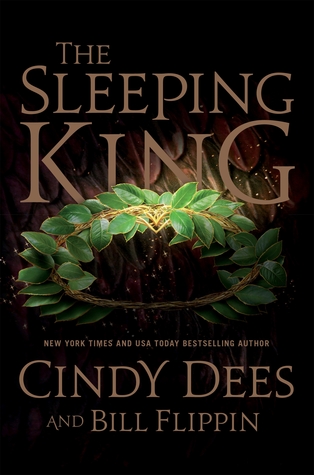 What has surprised you about writing epic fantasy?
What has surprised you about writing epic fantasy?
I understand now why Robert Jordan’s Wheel of Time books are the way they are. I always felt he spent a lot of time rehashing information from the previous books in each successive one. But now, I get that a certain amount of that is necessary. Some readers will pick up a book mid-series and get lost without some explanation. And significant time may have passed since readers of the earlier books have read the previous story.
We plan to finish the current arc in a few more books and then jump to another place or time in the history of the Dragon Crest world. We’ll start with a whole new batch of world building and characters. That way, new readers can hear about the series and have a decent starting point without having to go back and read all of the earlier books to avoid being lost.
What didn’t you expect when you started writing about a live action game?
I was startled at how certain events translated into print. In the live game, they were funny, but when I wrote about them, they were incredibly dark. Example: one of the bad guys in the live game, Governor Anton Constantine, was accosted by a commoner wanting something. He wouldn’t get out of the governor’s way, so Anton cut him down, killing him. As he strolled away, he commented, “When that guy resurrects, fine him five gold for bleeding on my floor.” It cracked everyone up in the live game, but written into a book, it was horrifying.
You say you’re writing an “old-school” epic fantasy. Why did you choose that?
Well, Self, we had several reasons. One is Bill and I both have children we’d like to be able to safely read our books. That meant we had to veer away from the current trend of intense violence and graphic sex in the fantasy market. Another is that we hope this series will stand up well over time. So much of commercial fiction today is fad based that it ultimately has a very short shelf life.
Why did you choose to go with a major publisher instead of self-publishing this series?
First, Tor has been a genuine joy to work with. I always figure authors say that because they’re scared their editors will find their blog post, but truly. Everyone at Tor has been awesome.
Second, I know everyone’s been all hyped up about self-publishing, and that traditional publishing has been getting quite a black eye recently. But our experience with Tor has been nothing but positive. Going with a major publisher has freed us up to think primarily about writing the books and running the live game. Tor designed the cover, wrote the back cover copy, built a marketing plan, publicized the book, printed it, distributed it to major book chains, got us reviews, and of course, edited THE SLEEPING KING. By the way, a traditional publisher puts a book through multiple edits by different people. The more eyeballs on a manuscript, the cleaner it ultimately comes out.
Bill and I didn’t have to worry about any of that stuff. They brought experts in each area to the project. Given how busy both of us are, turning over all the production to Tor has been a great choice. No regrets.
Any random thoughts about writing fantasy?
I wonder more often than I’d like to admit what J.R.R. Tolkien thought about when he was writing the Lord of The Rings cycle. I’ve read that he was trying to create an artificial system of mythology to prove to his students at Oxford that it could be done. I’ve also read that he wrote the stories to entertain his children. I can relate to both of those, now.
I wonder what he would have blogged about had the Internet existed when he was drafting the books. Would he have wondered if he was putting in too much of his made-up elven language, or would he have worried that he was spending too much time with Bilbo and Gollum running around in caves?
Would he have worried about the pacing, or how readers would react when he killed Boramir, or whether the language he chose would sound silly in a few years? I’d like to think he did, at least a little. I’d like to think that the experience of writing epic fantasy is somewhat universal in the same way that reading it is.
What makes THE SLEEPING KING special?
All epic fantasy readers who pick up a book enter into an agreement with the author to lose themselves in a different world for a few hours, to imagine far-flung realms, to vicariously perform heroic feats with the characters, and to imagine themselves inside that world. The difference with our book over others is that the reader really can go inside the world. It actually exists. Readers can not only visit the world, they can become pat of it. Heck, they can end up in future books. I think that’s a pretty cool possibility, and I hope it makes the reading experience even more vivid and exciting.
Thanks for interviewing me, Self. We should do this again soon. And thanks to the gang at Bookworm Blues for letting me hang out here with them!
September 22, 2015
Last Song Before Night – Ilana C. Myer
 About the Book
About the Book
Long ago, poets were Seers with access to powerful magic. Following a cataclysmic battle, the enchantments of Eivar were lost–now a song is only words and music, and no more. But when a dark power threatens the land, poets who thought only to gain fame for their songs face a task much greater: to restore the lost enchantments to the world. And the road to the Otherworld, where the enchantments reside, will imperil their lives and test the deepest desires of their hearts.
416 pages (hardcover)
Published on September 1, 2015
Published by Tor
Author’s webpage
Buy the book
This book was sent by the publisher in exchange for an honest review.
—
Last Song Before Night is a book that I was really looking forward to. It’s a debut work by Ilana C. Myer, and sets itself up for being something rather big, and impressively epic. However, it also focuses on poets and music, two things that I’m both tired of reading about, and really love taking a central role in my books if it’s done right.
I had high hopes, and my experience with this novel largely lived up to them.
Last Song Before Night is character driven, but as with most good characters, each individual in this story has multiple layers, as does the book as a whole. Things start out on the surface, and slowly the author delves deeper. As you move through the book, you’ll realize that the characters and the plot are evolving in surprising, impressive ways. Myer crafted her novel subtly, and much like any good song, the beginning and the ending are just memorable transitions to (and from) the epic crescendos and decrescendos of the work as a whole.
Last Song Before Night has multiple character perspectives. It’s interesting to note that each character, in some way, is lying to themselves and those around them and in that respect this book is a puzzle as readers try to puzzle out just who each character really is and what their true motivations are. It takes time for some of them to show the reader their secrets, while others wear it on their shoulders and are easy to pick out. Even the character(s) that seemed “bad” to me weren’t exactly who they seemed to be. They evolved, and while I never really warmed to them, they ended up being different than who I expected, with motivations that sometimes surprised me, if they sort of lacked a bit of the creativity I found in other characters.
The plot of this book is intricate, though it takes time to warm up and really get moving. Some readers might be put off by a somewhat slow start, and things don’t really get going until closer to the halfway point. However, the start of the novel isn’t uninteresting. In fact, I was captivated despite the fact that I couldn’t quite see where things were going. The world building is deft, and the musical and artistic qualities of the novel enchanted me. Like I mentioned above, this is a novel that has layers, and things aren’t always what they seem. It takes some time for the author to build up all those layers, but it’s done in a rather subtle, artistic way that caused me to enjoy each part of the book for what it was.
I’ve seen this book compared to Guy Gavriel Kay’s work, and in a lot of ways I completely agree. There is something to be said for the impressive talent the author has, her subtle crafting, and the lyrical quality of her prose. The world building was delightful and well thought out, and the characters were absolutely captivating. There are a lot of elements that play homage to epic fantasy roots – the magic, the sense of wonder and delight that never quite fades regardless of what is going on, and the quest itself as well as the group of people who embark upon it. It is a wonderful adventure, and an intricate song in just about every respect. There is a real tug of war that takes place throughout the book as characters have to give and take to make things happen. Often people are strained in interesting, uncomfortable ways, and those strains create fascinating plot elements. Not everything is easy, and many of these struggles that are faced force characters to face who they really are, and grow as a result. Furthermore, Myer has a wonderful way of challenging many old conventions in subtle ways without beating readers over the head with it all.
Last Song Before Night is a fantastic blend of old and new ideas. It pays homage to its epic fantasy roots, while moving into uncharted territory. Once things get going, they really get going. I found myself addicted to this book from the first page. I enjoyed the character development, the smooth and lyrical prose, the artistic quality to the work that appealed to my own inner musician and artist. The world building was beautiful, and the magic system was well crafted. Some readers might find the slow start a little troublesome, and there are some aspects of the magic system that didn’t seem completely believable in the context of the work as a whole, but those are small issues when compared to the high quality of this debut work.
Last Song Before Night is a debut the author should be proud of. It is addicting, artistic, and completely magical.
4/5 stars
September 21, 2015
Guest Post | Making It Real – Christie Meierz
 About the Author
About the Author
Award-winning author Christie Meierz writes space opera and science fiction romance set in a civilization of empaths on the edge of a dystopic Earth empire. Her published works include her bestselling debut novel, The Marann, its sequels, and two prequel short stories published in Into Tolari Space ~ The First Contact Stories. Her forthcoming novel, Farryn’s War, will come out on September 22, 2015.
Christie has spent a night and/or eaten a meal in all 50 U.S. states, plus Puerto Rico and the U.S. Virgin Islands. Currently, she lives in Pittsburgh, Pennsylvania with her mathematician husband and an assortment of stuffies. When she’s not writing, she writes about writing on her blog, Meierz Musings, and Facebook and this page,where she welcomes comments and friend requests, Google + page, and Twitter.
You can read more about her book, Farryn’s War here.
Making It Real
By Christie Meierz
When I was 23 years old, my older brother’s motorcycle slipped on a wet road while his ship was docked in Charleston, SC. It wasn’t going very fast; the buddy riding with him slid off the back and bruised his butt. My brother tried to stay with the bike and got flung headlong into a concrete embankment. Were it not for his helmet, the best he could afford on his Navy pay, he would have been killed instantly.
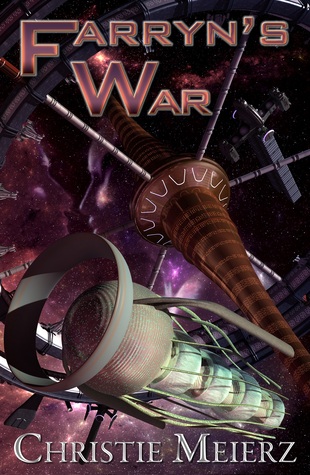 As it was, he sustained a pretty severe closed head injury. He was in a coma for three weeks, and when he woke up, well, he was never the same. It was like he was fifteen years old again. All teenager, all the time, in an adult male body. Poor judgment. Poor impulse control. Thankfully not too moody. Eventually, he came to live with me, and I got to see at close hand the effect of brain trauma and amnesia. He never forgot who he was. He never forgot who I was, or who our parents were. But he forgot most of his adult life, and much of his childhood, and did not remember the way he tormented me growing up, or that as children, set at odds by our father, we hated each other.
As it was, he sustained a pretty severe closed head injury. He was in a coma for three weeks, and when he woke up, well, he was never the same. It was like he was fifteen years old again. All teenager, all the time, in an adult male body. Poor judgment. Poor impulse control. Thankfully not too moody. Eventually, he came to live with me, and I got to see at close hand the effect of brain trauma and amnesia. He never forgot who he was. He never forgot who I was, or who our parents were. But he forgot most of his adult life, and much of his childhood, and did not remember the way he tormented me growing up, or that as children, set at odds by our father, we hated each other.
Thirty years later, I’m writing my third science fiction novel, and drawing on my own life experience to flesh out my characters, and I think, The amnesia trope is so seldom done right. What if I tried it?
It didn’t daunt me too much, though perhaps it should have. I am not a doctor, nor do I play one on TV, and I was giving a serious brain injury to a character I love—Laura Johnson Howard. Stranded on Tolar by a plot of Earth’s government, and physically about 25 at the time of the story, she started out in the previous book as a 60-year-old woman, rejuvenated by an almost magical substance called the Jorann’s blessing. That complicated matters, because the blessing not only rejuvenates, it transforms any unmodified human who takes it into a Tolari empath. It does this slowly, however, taking years to complete, and at the time of the injury, she was only about 8 months into the process. Her brain was still transforming.
I used that to give her back some memories, returning them in the form of flashbacks as the transformation healed connections. Meanwhile, her life became almost unbearable, because, like my brother, she had forgotten her adulthood, but unlike my brother, she had become involved in a permanent love relationship—with a man she could no longer remember. Laura at first can’t even understand what she’s doing on a planet, after spending her life aboard Earth Fleet command carriers, or why she knows what this strange man feels. Her former warmth and wisdom have vanished, and she’s impulsive and moody.
Insert a huge political upheaval, with an impaired heroine, a confused hero, and well-meaning but misguided friends. That was the point at which I decided to make Laura one of the main POV characters, trying to incorporate what I had learned of my brother’s frustrations with his own misfiring brain. From everyone else’s point of view, she’s the problem, but from her point of view, no one wants her—they’re all waiting for her to return to a former, much-loved self that she can no longer remember.
That was a bit of a twist on how it fell out with my brother. In his case, he became a much nicer person than he was before (even if he was annoying as all hell because he’d lost the ability to tell when people were getting fed up with the jokes and the pranks). Laura will, eventually, settle down, but she’s snappier and always will be.
That’s a major change for her.
So that was my first foray into writing an impaired character. My fourth book has none, but it does set up one of its main characters to be challenged in its sequel, the elevator pitch for which goes something like this:
An empath with PTSD is a terrible thing.
It should be a very interesting—and illuminating—experience to write.
September 17, 2015
Guest Post | The Aspiring Author and the Temple of Bad Reviews – Kristi Charish
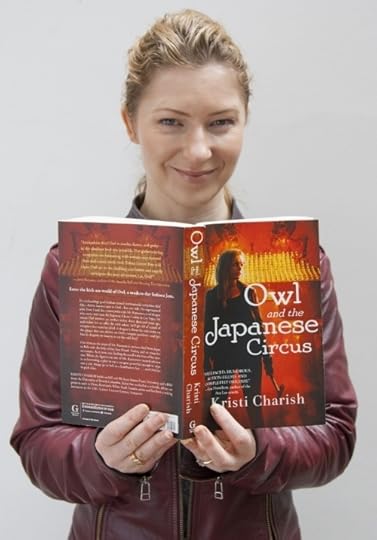 About the Author
About the Author
I’m Kristi, the author of OWL AND THE JAPANESE CIRCUS (Jan 13th, 2015, Simon & Schuster Canada/Pocket Books US), an urban fantasy about Ex-archaeology grad student turned international antiquities thief, Alix— better known now as Owl—a modern-day “Indiana Jane” who reluctantly navigates the hidden supernatural world.
I write what I love; adventure heavy stories featuring strong, savvy female protagonists, pop culture, and the occasional RPG fantasy game thrown in the mix. The second instalment, OWL AND THE CITY OF ANGELS, is scheduled for release Jan 2016. My second series, KINCAID STRANGE (Random House Canada), about a Seattle voodoo practitioner who rooms with the ghost of late grunge rockstar, Nathan Cade, will be out May 2016.
Besides writing I’m also a scientist. I have a BSc and MSc from Simon Fraser University in Molecular Biology and Biochemistry and a PhD in Zoology from the University of British Columbia. My specialties are genetics, cell biology, and molecular biology, all of which I draw upon in my writing.
Authors I love: Ernest Cline, Kim Harrison, Jim Butcher, Patricia Briggs, Diana Rowland, Cassandra Clare, Ian Hamilton, and Suzanne Collins to name a few.
Read more about her on her website.
Buy her book
The Aspiring Author and the Temple of Bad Reviews
By Kristi Charish
Ok, so maybe I shoehorned the Indiana Jones reference in there a little tight, but come on; when it comes to navigating online review etiquette, a temple full of booby traps, giant bowling balls ready to crush you at the first misstep, and an army of poison dart wielding internet goers lying in wait is a pretty apt description of the potential mind field awaiting you. Especially if you don’t watch your step.
With the constant occurrence of author flame wars on Twitter and the strange paradox we’ve entered in the internet age where author interaction with fans and reviewers has reached a nebulous grey zone, I thought it’d be a great time to talk about how we authors might want to consider navigating the Temple of Bad Reviews.
Why am I donning the fedora and taking on this adventure, you ask? Because as a cohost on AISFP and as an author with two urban fantasy series, I am firmly entrenched on both sides of the fence. That’s right; not only do I write the odd bad review, I see the odd bad reviews about my own work. Two sides of the coin, right here folks!
So where do we begin our Adventure? The first booby trap you are likely to encounter and how to disarm it:
Your very first, dreaded 1 star review
Strategy: Just be really *&^%ing happy someone read your book.
Tough love, I know, but seriously. And I’m saying this from both sides of the fence- reviewer and debut author. Not only have I hated someone else’s debut, there are people out there who thought my first step out of the gates was an abysmal effort not deserving of the paper it was printed on. And they had no problem explaining why.
Good on them. I’m just happy they picked up/downloaded my book. I get the impression a lot of authors (especially the debuts) don’t quite understand just how many books are published each month. Ask any reviewer out there; the sheer volume of books we’re inundated with on a weekly basis is staggering. Not dozens, there can be HUNDREDS. There is no way a team of us can go through all the books.
If someone bothered to pick up your book and read enough of it to give it a 1 or 2 star rating, they were interested in it enough to open the cover. Seriously, you should consider that a huge win. It will actually appear on their Goodreads page or blog roll. Fifty other novels they could have just as easily downloaded off NetGalley won’t. Also, keep in mind they may have hated your book but chances are good they’ve given 5 and 4 stars out to other authors and vice versa. Intimidating reviewers from honestly rating and discussing a book hurts all of us.
…But they’re a one star troll!
Similar trap: ‘they said horrible things about my mom!’
I worry this one get’s thrown around a little too fast and loose. Yup. You betcha. 1 star gremlins (and mom haters) exist (and like gremlins usually come out after midnight and multiply like crazy if you feed them). For those not in the know, the true one star gremlin species is a reviewer who has an account on Goodreads and/or amazon and 1 stars every single book they come across. Also closely related to the two star wunderbeast. I’m guessing it’s a form or entertainment. To each their own/pick your poison.
How to deal? Ok, I’m not going to pretend this doesn’t exist. It totally does. Like every other debut author out there, I also went through the one star troll initiation. Technically it’s against most review site policies to simply troll reviews with those pretty little solo stars, but it’s hard to enforce…and do you really want to be the person to blow the whistle…or spend hours combing your reviews on Goodreads for a gremlin…I mean, it’s like hanging out in the first segment of the Indiana Jones temple trying to find all the little poison darts…For Gods sake, Indy- just run for it!
And keep it in perspective. Keep in mind that in over 600 Goodreads reviews, I’ve encountered exactly 2 Gremlins (I checked for this post, and believe me it was a colossal waste of time). The other 20 odd bad reviews? They genuinely and honestly just didn’t like the book, and the majority of folks who expressed why had great reasons on why it wasn’t for them.
I think authors loose track of the point, which is that the gremlins and trolls are few and far between. The vast majority of reviewers on Goodreads are there because they love books, not to form a secret cabal to stalk out debut authors and singlehandedly ruin your career…first off, I have it from good authority from a number of bloggers I chat with that there’s no way they’re that organized – think herding cats.
For the 1 star gremlins and 2 star wunderbeasts out there (and mom haters?) If your definition of fun on a Friday/Saturday night is combing Goodreads for new books so you can one star them…which takes COLLOSAL HOURS of effort…I’m going to suggest we leave them to it. We should all feel a little bad they don’t have something better going on – like READING a book or socializing- and we should leave them the one form of entertainment they’ve found.
Trap you say? I can handle anything!
Keeping the Author Ego in Check
This is a big generalization but, much like being an Indy style archaeologist/tomb raider, choosing the writers career path generally requires an above average amount of ego. Understandable considering it’s a profession that is based upon the belief that someone might want to read (and pay for) random ideas you’ve got floating around in your head. I will own up to this one myself. My god, I sent my DEBUT manuscript off to a favorite author’s agent…as Lily Allen would say, that takes a pretty serious pair of tits.
I’m not going to berate the existence of the author’s ego. I actually think a healthy ego is essential for an author, strictly for survivals sake. Writing is a career based on entertainment, where you are going to face a substantial amount of rejection. You need an ego to take that colossal rejection and deal with the question ‘ Am I really good enough?” on a daily basis.
But note I used the word ‘healthy’ when describing the authors ego, and when it comes to reviews that authors ego needs to be firmly leashed and muzzled at the door.
Ex: Let’s dissect a typical online author meltdown in 10 easy steps:
Reviewer reads a book. 2. Reviewer does not care for said book. 3. Reviewer expresses their dislike – nicely or not – 4. Author reads said review. 5. After staying up past midnight staring at the wall and considering said review over and over again. 6. Convincing themselves that the reviewer simply ‘didn’t get it’, author drafts response and publishes. 7. Reviewer is unmoved by authors pleas and defends their right to review and discuss work of art in peace. Other reviewers come to said reviewers defense. 8. Author is convinced there is a reviewer cabal set on ruining their career and now no one will buy their book because of that single review. 9. Online meltdown ensues, let the Twitter games begin! 10. After midnight, Trolls emerge in numbers.
The meltdown can be attributed to two toxic mistakes on the author’s part.
They took the review as a personal critique and, 2. Felt obligated to defend their work.
Taking critiques personally stems from not leashing your ego. Your work is no longer yours. It is a piece of entertainment art meant to be consumed by the public. As Shmendrick the magician would say: ‘You are the bearer, the messenger!’ Once your book is out in the open you have very little to do with it.
A significant part of my job as a researcher was defending my work. On a daily basis I had to present aspects of my research and my hypothesis and defend them vigorously to my peers. Why? Because, once published, other researchers in my field around the world would use my hypothesis and results to move their research forward. It was to be part of a greater piece of research, which others would partake and participate in. That is why scientists argue and tested our theories so much.
A novel is many things but it isn’t that. At its core it’s a piece of entertainment that your readers read to INTERPRET AND ENJOY. Whether they like it or not, arguing against their interpretation of the art they’ve consumed steps over a sacred deal between entertainer and audience…kind of like Indy swiping that idol in Raiders. It’s going to end up bad.
Those are the biggest minefields to navigate as a new Raider/Author. Join us next time for: ‘They liked my book so I should hang around and chat, right?…
September 16, 2015
First light – Linda Nagata
 About the Book
About the Book
Reality TV and advanced technology make for high drama in this political thriller that combines the military action of Zero Dark Thirty with the classic science fiction of The Forever War.
Lieutenant James Shelley, who has an uncanny knack for premeditating danger, leads a squad of advanced US Army military tasked with enforcing the peace around a conflict in sub-Saharan Africa. The squad members are linked wirelessly 24/7 to themselves and a central intelligence that guides them via drone relay—and unbeknownst to Shelley and his team, they are being recorded for a reality TV show.
When an airstrike almost destroys their outpost, a plot begins to unravel that’s worthy of Crichton and Clancy’s best. The conflict soon involves rogue defense contractors, corrupt US politicians, and homegrown terrorists who possess nuclear bombs. Soon Shelley must accept that the helpful warnings in his head could be AI. But what is the cost of serving its agenda?
405 pages (paperback)
Published on June 30, 2015
Published by Saga Press
Author’s webpage
Buy the book
—
I’m not a huge fan of military SciFi. I mean, I’ll read it, but I don’t generally go out of my way to do so. However, when this one was recommended to me by an author I really admire, I knew I had to give it a shot.
First Light by Linda Nagata is… wow. Really, that’s all you need to know.
First Light takes place in the near future. War is business, and technology is the fuel it runs on. This is a rather cynical look at the great war machine, but no less compelling or thought provoking due to that. In fact, I enjoyed the rather cynical tone and found that it gave the book a greater depth than I was expecting to find in a military science fiction novel.
The technology is fascinating, and incredibly realistic. Connections in the brains of soldiers keep them informed and constantly connected with military intelligence. They are always being recorded and observed, and none of their actions go unchecked or unnoticed. Their emotions are moderated through connections in their skulls. And there are other modifications which are incredibly believable and very well crafted. For example, artificial limbs that allow soldiers to get back into battle quicker, and function better than normal limbs. There are modifications with vision that allow individuals to see better, and further.
Technology isn’t always a good thing. In fact, in First Light the technology is really one of the more interesting moral quandaries in the whole novel, as well as one of the most important plot points. James Shelley, our protagonist, is the first one who notices that not all things are as they seem. Shelley has some odd precognition, moments his fellow soldiers call “King David moments.” He has some incredible luck, and his hunches almost always end up saving lives, or winning battles. When Shelley and his comrades start investigating exactly why this is happening, things start to get interesting.
Nothing about this novel is simple. War is business, a game played by powerful individuals referred to as dragons. Soldiers and armies are nothing more than pieces to be moved around. Technology is helpful, but what happens when the technology outpaces the people who invent it? So much about this novel toes the line. Everything has a good and a bad side. The military is presented in a really sympathetic, fantastic light. It’s easy to admire the devotion and loyalty that those in the military feel for each other. However, not every war is just. Technology is helpful, giving soldiers a necessary edge, and saving and improving lives, but there’s a limit where helpful becomes harmful and Nagata examines this at length in First Light.
Basically, everything has a dark and a light side, and Nagata really explores both sides deftly and it is incredibly thought provoking. Too much of a good thing is still too much. Sometimes it is easy to forget that, but Nagata reminds readers in unforgettable ways.
The first half of the novel is spent establishing many of these concepts, and exploring some of the dark and light sides of the issues presented. However, the second half the scope really expands. The plot becomes broader, and global. Shit was real before, but in the second half shit gets even more real (does that even make sense?). The plot is intricate, and there are a lot of threads that weave together, sometimes it gets confusing, but things work themselves out quickly enough.
First Light had me on the edge of my seat from the first sentence to the last page. This book has some of the most pulse pounding scenes I’ve ever read. The gritty realism makes it all just that much more engrossing and believable. Things move quickly, and it’s absolutely impossible to put this book down once you get into it. The ending is remarkable. Mostly what impressed me, despite all of what I’ve already said, is how thought provoking this book was. It’s the perfect blend of action, intrigue, and cynical analysis of important issues.
First Light blew me away. I absolutely devoured this book, reading it in all my spare minutes and seconds. Linda Nagata writes one hell of a yarn. I can’t wait to see what happens next.
4/5 stars
September 15, 2015
The Veil – Chloe Neill
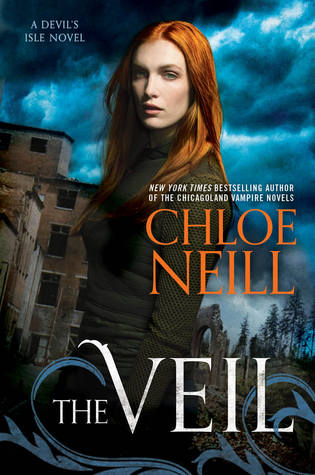 About the Book
About the Book
Seven years ago, the Veil that separates humanity from what lies beyond was torn apart, and New Orleans was engulfed in a supernatural war. Now, those with paranormal powers have been confined in a walled community that humans call the District. Those who live there call it Devil’s Isle.
Claire Connolly is a good girl with a dangerous secret: she’s a Sensitive, a human endowed with magic that seeped through the Veil. Claire knows that revealing her skills would mean being confined to Devil’s Isle. Unfortunately, hiding her power has left her untrained and unfocused.
Liam Quinn knows from experience that magic makes monsters of the weak, and he has no time for a Sensitive with no control of her own strength. But when he sees Claire using her powers to save a human under attack—in full view of the French Quarter—Liam decides to bring her to Devil’s Isle and the teacher she needs, even though getting her out of his way isn’t the same as keeping her out of his head.
But when the Veil threatens to shatter completely, Claire and Liam must work together to stop it, or else New Orleans will burn.
336 pages (paperback)
Published on August 4, 2015
Published by Penguin Random House
Author’s webpage
Buy the book
This book was sent by the publisher in exchange for an honest review.
—
I am not new to Neill’s work. I have read some of her Chicagoland stuff. I enjoy her sense of humor and her ability to write a light, fun story though I tend to struggle with the subject matter of that series. However, with that in mind, I was pretty excited to get my hands on The Veil. I was anxious to see what else the author could do with her writing chops.
The Veil takes place in a sort of post apocalyptic New Orleans. This is obviously the first book in the series, and the first half of it is rather full of infodumps, so readers should be aware of that. Neill is laying down the groundwork for a war, and a magic system. Her protagonist, Claire, does this by reminiscing a lot. This didn’t really bother me too much because the book is short and moves quickly so the infodumps at the start were over pretty fast. However, they are there, and they can make the book feel a little bogged down at the start.
New Orleans is a hard place to set a speculative fiction book because so many are set there. Neill set the bar pretty high in this regard. In order for New Orleans to impress me in an urban fantasy book, it has to be something completely new and different. In some ways, this New Orleans could be just about any city. It’s unique due to the divided nature of it after the war, and the post war cultural shifts. New Orleans was less interesting to me than Devil’s Isle, and I quickly found myself wanting to read more about Devil’s Isle and the veil itself than anything taking place in New Orleans. Devil’s Isle is where the interesting world building takes place. While there are nuggets of it in New Orleans, the strength of Neill’s world building definitely lies elsewhere.
In regards to world building, much of the groundwork has been laid here, but I think the heavy world building will really take place in other book in the series. This book felt more like an introduction, a book where the author gently laid out some concepts and left them before they became overwhelming. I think in book two and further she will easily build upon the foundation she laid here.
Claire is a character that sort of underwhelmed me in a lot of respects. It was hard for me to feel like she was incredibly unique and individual until the second half of the book, probably because the first half is spent with her reminiscing so much so readers can get the information they need. Like the world building, I think Claire is a complex character whose foundation was laid in The Veil, but will be elaborated on in future books. Unfortunately, due to this she felt rather cookie cutter, and didn’t quite shine as much as I wanted her to.
Liam was the most interesting character. He’s introduced as a rather stereotypical urban fantasy love interest, but quickly becomes something else as Neill makes it obvious that any romantic inclinations are going to take a back seat to the plot and inner workings of the novel (thank you!). He’s pretty mysterious, and completely compelling. Liam was like Devil’s Isle in my estimation. He’s where the real interest is.
The plot is interesting, and it moves pretty quickly. In some ways it is pretty predictable. Claire finds herself in the center of something large and unexpected. She gets thrust into a situation with the enigmatic Liam and has to navigate treacherous waters as she learns that she’s the linchpin for this potentially cataclysmic developing situation. There isn’t anything incredibly new there. What really makes this shine is Neill’s unique voice, her smooth flow, and the unique world where this takes place. It was hard for me to put this novel down, purely because the mixture of Neill’s writing and the interesting world building and character developments kept me pretty hooked.
The Veil is a promising start to a new urban fantasy series. While some elements might underwhelm readers, it’s a surprisingly addicting novel with enough unique elements to please just about any urban fantasy fan. I devoured this book despite any issues I had with it, and I’m anxious to read the next installment of this series.
3/5 stars



